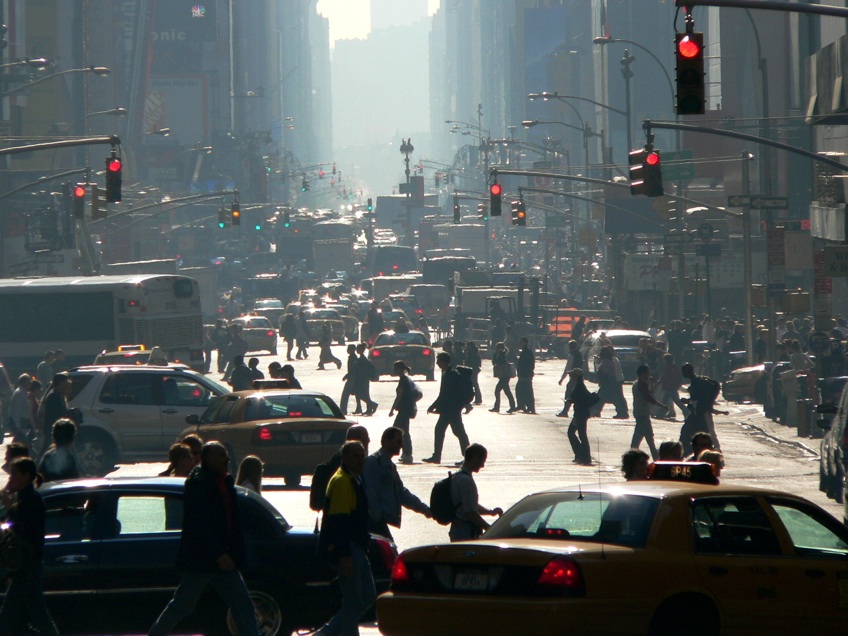We recently wrote here about Illich's time as a priest in northern Manhattan. While researching that item, we'd come across a bulletin board devoted to "Personal Memories of Growing Up in the Heights" - Washington Heights, that is, a neighborhood right near the George Washington Bridge. We posted a query on that board, asking if anyone remembered Father Illich. And today, we're pleased to share the first response, which is not only generous but quite interesting. Thank you, Mr. Stafford. (We've taken the liberty of tweaking the original text, here, solely to improve readability.)
Re(1): Rev. John Illich
Posted on April 2, 2011 at 10:22:49 AM by Frederick Stafford
I am pleased to share with you these few memories I have of Father Illych who made such a great impression on me when I attended New York City's Incarnation Grammar School during the mid-1950's.
He was a very young man when he came to Incarnation which he did, I believe, straight from the seminary. Incarnation Parish at that time was primarily Irish with few Hispanics, the Puerto Rican wave of immigration having only recently started (today, of course, even they have moved to Jersey and the parish is now almost entirely Dominican.) The priests themselves were all either from Ireland or of Irish descent except for Father Illych, whom we assumed to be Russian, and who stood out from his colleagues by reason of this difference.
He and another young priest, Father Conlin, were the favorite confessors of us boys as we knew them to be more lenient than their older colleagues, especially one older intemperate father often heard berating abashed sinners within his confessional. We knew we could count on these younger priests to dole out but the mildest of penances for our grievous sins. Father Conlin was popular too as he was not that much older than us and fond of sport, often joining us in games attired in his cassock; his was a sunny disposition whereas Father Illych always seemed to have a cloud of sorrow hanging over him, as though suffering for fallen humanity, much as Christ did.
His brow was always furrowed and his face etched with lines of worry. Once he was compelled by his superiors to administer a solemn oath to the congregation that we forebear attending the movie, Baby Doll, an order apparently much to his distaste but which he executed as if it were but one more burden that he must bear.
Another time he gave a sermon on the correct way to pray, cautioning us against the rote recitations and hastily rattled off prayers so typical of Catholics, at one point startling us all by raising his arms in aloft and crying out in as dramatic a demonstration from the pulpit as I have ever seen, "When you pray you must pray with all your heart! You must throw yourself down on your knees like this (he half-knelt so we could still see him in the raised pulpit) and cry out to God, 'Oh Lord, hear me! hear this prayer of a lowly sinner, I beg of You! Please God, please, please!' And there were tears in his eyes to match the emotion in his voice.
Years later when I read The Brothers Karamazov I imagined the saintly brother Alyosha as resembling Father Illych. I have read that novel numerous times over the years and it is always Father Illych's face that comes to mind when I get to Alyosha. I had assumed Father Illych was Russian and was surprised to learn that he was Austrian. Only once did I witness his short temper and that was exacerbated by my exceedingly lame pronunciation of Latin when he was training us boys to serve at the alter.
I was surprised to hear years later that he had left the priesthood, as I couldn't imagine him in any capacity other than as a man of God, and he never gave any indication of being the consummate scholar he indeed was. I never knew him that well and I doubt if he would ever have remembered me, but he made a great impression on me and many others to whom he represented something of an archetype.
Interestingly, Lee Hoinacki points to this same book,
The Brothers Karamazov, in his essay, "Reading Ivan Illich," which serves as one of the introductions to
The Challenges of Ivan Illich. "Illich was trained in ecclesiology and was especially intrigued by liturgy," he writes.
He understood, I would argue, that the most ominous expression of secularization in the West was not the death of nature (although this was related), nor a misnamed materialism, nor sexual “freedom,” but the decline of liturgy, the routinization and emptying out of religious ritual in the churches. As he suggests, this process began with clerical actions to establish various assured institutional responses to God’s calling, later legitimated by a juridical or legal order; men hesitated to rest all hope on gratuitous gifts of grace. Illich captures the dénouement of this lack of faith with the ancient Latin adage corruptio optimi quae est pessima (the corruption of the best turns out to be the worst). He has attempted to show that this apothegm accurately reveals the origins of “normative notions of a cruelty, of a horrifying darkness, which no other culture has ever known.” Fyodor Dostoyevsky, in The Brothers Karamazov, portrays institutional mistrust as a demonic temptation in Ivan’s poem, “The Grand Inquisitor,” perhaps literature’s most terrifying image of the betrayal of the freedom graciously given to people by Jesus.

